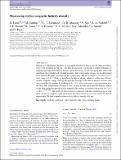Measuring stellar magnetic helicity density
Abstract
Helicity is a fundamental property of a magnetic field but to date it has only been possible to observe its evolution in one star – the Sun. In this paper, we provide a simple technique for mapping the large-scale helicity density across the surface of any star using only observable quantities: the poloidal and toroidal magnetic field components (which can be determined from Zeeman–Doppler imaging) and the stellar radius. We use a sample of 51 stars across a mass range of 0.1–1.34 M⊙ to show how the helicity density relates to stellar mass, Rossby number, magnetic energy, and age. We find that the large-scale helicity density increases with decreasing Rossby number Ro, peaking at Ro ≃ 0.1, with a saturation or decrease below that. For both fully and partially convective stars, we find that the mean absolute helicity density scales with the mean squared toroidal magnetic flux density according to the power law: |⟨h⟩| ∝ ⟨Btor2⟩0.86±0.04. The scatter in this relation is consistent with the variation across a solar cycle, which we compute using simulations and observations across solar cycles 23 and 24, respectively. We find a significant decrease in helicity density with age.
Citation
Lund , K , Jardine , M , Lehmann , L T , Mackay , D H , See , , Vidotto , A A , Donati , J-F , Fares , R , Folsom , C P , Jeffers , S , Marsden , S C , Morin , J & Petit , P 2020 , ' Measuring stellar magnetic helicity density ' , Monthly Notices of the Royal Astronomical Society , vol. 493 , no. 1 , pp. 1003-1012 . https://doi.org/10.1093/mnras/staa297
Publication
Monthly Notices of the Royal Astronomical Society
Status
Peer reviewed
ISSN
0035-8711Type
Journal article
Description
KL acknowledges financial support from the Carnegie Trust. MJ acknowledges support from STFC consolidated grant no. ST/R000824/1. LTL acknowledges support from the Scottish Universities Physics Alliance (SUPA) prize studentship and the University of St Andrews Higgs studentship. DHM would like to thank both the UK STFC and the ERC (Synergy grant: WHOLE Sun, grant agreement no. 810218) for financial support. VS acknowledges funding from the European Research Council (ERC) under the European Unions Horizon 2020 research and innovation programme (grant agreement no. 682393, AWESoMeStars). JFD and AAV acknowledge funding from the European Research Council (ERC) under the H2020 research and innovation programme (grant agreement nos. 740651, NewWorlds, and 817540, ASTROFLOW).Collections
Items in the St Andrews Research Repository are protected by copyright, with all rights reserved, unless otherwise indicated.

